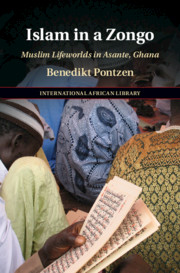Book contents
- Islam in a Zongo
- The International African Library
- Islam in a Zongo
- Copyright page
- Dedication
- Contents
- Figures
- Acknowledgements
- A note on style
- Glossary
- Introduction
- 1 A history of Muslim presence in Asante
- 2 Muslim presence and zongos in Asante
- 3 Those who pray together
- 4 Speaking for Islam
- 5 ‘Bōkā’
- Conclusion
- Appendix
- References
- Other sources
- Index
- Titles in the Series
1 - A history of Muslim presence in Asante
Published online by Cambridge University Press: 08 January 2021
- Islam in a Zongo
- The International African Library
- Islam in a Zongo
- Copyright page
- Dedication
- Contents
- Figures
- Acknowledgements
- A note on style
- Glossary
- Introduction
- 1 A history of Muslim presence in Asante
- 2 Muslim presence and zongos in Asante
- 3 Those who pray together
- 4 Speaking for Islam
- 5 ‘Bōkā’
- Conclusion
- Appendix
- References
- Other sources
- Index
- Titles in the Series
Summary
Chapter 1 narrates a history of Muslim presence in Asante. Drawing on oral histories, interviews, archival records, and secondary literature, I trace this history since the early eighteenth century. Originating from across the West African subregion, Muslim migrants have been present as a minority in Asante at least since the foundation of the Asante dominion in around 1700. Throughout the Asante dominion, theirs was a small community of Dioula living at the royal court. Under colonial rule, numerous Muslim traders and labourers from the northern regions moved into Asante and founded zongos across the region. In the process, Hausa displaced Dioula as the hegemonic group, and the Qadiriyya order became the predominant Islamic group in the zongos. During the early twentieth century, the Qadiriyya were supplanted by the Tijaniyya, who held Islamic hegemony until the 1970s, when they came under open attack by the reformist Sunna. Up to the present, both groups have struggled for Islamic hegemony in the zongos. As I argue, the current diversity of lived Islam in the zongos is at once informed by this changing history and informs its divergent and contested narrations, which are part of and co-shape the discursive tradition of this religion.
Keywords
- Type
- Chapter
- Information
- Islam in a ZongoMuslim Lifeworlds in Asante, Ghana, pp. 32 - 67Publisher: Cambridge University PressPrint publication year: 2021

